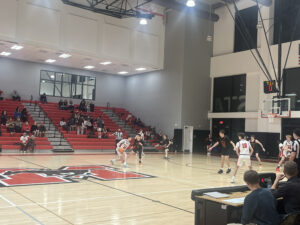Fresh out of college, Falls Church native Greg Corbino, as expected, is deeply involved in the launch of his adult stage career, although in a slightly different mode than many who knew him so well from his performances in local high school musicals might think.
Since graduating from Emerson College last summer, Corbino has gone full time with the highly-dedicated troupe of puppeteers and actors who perform the strong anti-establishment social commentaries of the famous “Bread and Puppet” productions.
“Bread and Puppet” is the unique creation of its founder and continuing producer, director and performer Peter Schumann, who began his venture as a form of radical street theatre in the early 1960s in New York City, which blossomed in the height of the anti-Vietnam War, pro-counterculture ferment of the late 1960s.
Their production, including matinee “circuses,” completed a two-week run at the famous Theatre for a New City in New York City’s East Village earlier this month, where the News-Press caught up with the now-bearded Corbino for an interview that provided first-hand insight into his personal development and the troupe’s efforts.
Corbino and his older brother grew up in the Falls Church school system, sons of Connie and Peter Corbino on Forest Drive, and Greg always had a theatrical, and especially musical, bent. One of his middle school teachers described him as a youth who would suddenly break out in a song sitting at his desk during a math class. “That was just Greg,” she exclaimed, fondly.
Greg first broke into the pages of the News-Press in the early 1990s lugging the Corbinos’ giant family cat, taking up the challenge in the paper’s weekly “Critter Corner” feature on who was the biggest cat in Falls Church.
In middle school and at George Mason High School, Greg was in all the talent shows, plays and musicals, culminating that stage in his career with his memorable performance, pictured on the front page of the News-Press performing the male lead role of Curly in “Oklahoma!” during his senior year in 2004.
Heading to college in Boston with the aim of majoring in musical theatre, he returned to his home town during breaks, and for a couple of summers worked at the summer youth camps of the locally-based theatre and visual arts-training Creative Cauldron non-profit organization.
But after his second year at Emerson College, Corbino explained, his thoughts about the theatre began to change. Instead of musicals, he shifted his focus to dramatic theory and began to dabble in puppetry.
“I began to feel that there were too many limits on personal creative potential in the musical theatre,” he told the News-Press. “I know I had a promising future in the musical theatre, but I wanted to delve into the areas that would allow for more growth.”
About the same time, one of his drama professors introduced him to “Bread and Puppet,” a legendary theatrical phenomenon in its circles that operates year-round based at a 250-acre farm in Vermont, where members of the troupe live, grow their own food, and hold summer workshops, festivals and classes over the summer months when the troupe is not out on tour.
When he signed up for a summer internship, he said he was “blown away” his first day at the farm when he took a tour of the troupe’s museum building, where hundreds of puppets of all sizes, some 14 feet tall, used over the troupe’s 40-year history, were all assembled.
 “The sense of history and of the impact of this effort over all the years really struck me” when he entered the room, he said.
“The sense of history and of the impact of this effort over all the years really struck me” when he entered the room, he said.
Upon his graduation last May, he asked to join the troupe full time, and was welcomed aboard.
When on tour, the troupe of about two dozen performers, led by Schumann, perform at college and university campuses, and in community theatres. The productions are a tapestry of highly-creative episodes interweaving puppets with humans, moving props and small band music and sound effects.
They include the “Dirt Cheap Opera,” described by the troupe in a press release as “the story of the gangster Mac the Knife and the brand new wife Polly, consisting of fragments stolen from the famous Brecht/Weill “Three Penny Opera, newly mixed and freshly re-baked to suit the taste of the citizens of our divine republic which is reigned over by the gods of love, money, justice and revenge.”
Corbino said he has the same role in all the performances, which do not involve singing, but creative use of the puppets and acting.
He said that while there is little in the productions that comments on specific political events, the general theme shows how things ranging from indifference, to greed, to perpetuating the status quo and deceit lead to disastrous and deadly consequences.
Often in the background are the set of 14-foot-tall puppets looming over the stage and sometimes the audience that are known to the troupe as “the gents,” Corbino said. They have deadpan expressions and often represent the “establishment status quo.”
Sometimes the troupe’s productions rub locals the wrong way, especially when they’re not prepared in advance about what to expect. At a community theatre in Wilmington, North Carolina last fall, Corbino said, the locals misunderstood and thought they would be performing a children’s show.
They lined up children for the audience, but when the troupe began performing their sharp social commentaries, the event’s organizers became upset. A woman stepped forward and stopped the show in mid-stream, Corbino said, and shut it down.
Corbino said the main downside of involvement with the troupe and the personal dedication and intensity it demands is “a lack of personal privacy.” They travel together in a bus when on tour, have no money and sleep at the homes of friends or supporters.
But he’s enamored of the effort, and the sense of community shared by the members of the troupe, all in their twenties except for Schumann, who is in his 60s.
As for his career, he wants to learn from the mastery of Schumann, who directs, designs sets, props and puppets, and writes new material for the troupe, he said, and follow in his footsteps, helping to advance the art form.
Corbino, who was home for the holidays with his family in Falls Church, said his parents have seen the show, and like it “because they know how much I enjoy it,” he said.
Corbino and the “Bread and Puppet” troupe will come to Washington, D.C. to perform the “Dirt Cheap Opera” on January 9 and 10 at 8 p.m. at the St. Stephens Church, 1525 Newton St. NW (on the corner of Newton and 16th St. NW) in the District. Inexpensive tickets will be available at the door for the 50-minute production. More information is available at 802-376-4622.













